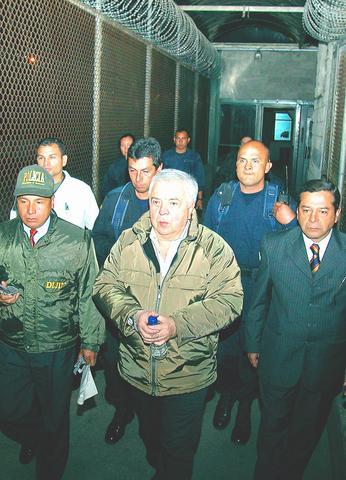Drug kingpin Gilberto Rodriguez Orejuela, wearing handcuffs and a bulletproof vest, was put aboard a US government plane Friday night and flown to the United States for trial, becoming the most powerful Colombian trafficker to ever be extradited to America.
A phalanx of helmeted police armed with assault rifles escorted the leader of the once-feared Cali drug cartel to the plane at a military airfield on the edge of Bogota. It took off into the night sky minutes later. Top American and Colombian authorities hailed the extradition.

PHOTO: AP
``Every day judicial cooperation between our two countries is becoming more effective and more visible,'' Colonel Oscar Naranjo, chief of Colombia's Judicial Police, told reporters. ``This means that the criminals will not find any sanctuary to evade justice.''
US Attorney General John Ashcroft said: ``Those who violate federal drug laws should never believe that drug trafficking from outside our borders puts them beyond the reach of justice ... Rodriguez-Orejuela will now stand trial for his actions.''
Soldiers and police brandishing rifles guarded a convoy that sped the kingpin from La Picota prison to the airfield.
The kingpin, whose hair has gone gray and who has turned chubby while in a Colombian prison over the past nine years, faces trial in federal courts in Miami and New York for trafficking cocaine and laundering money. Naranjo said the flight was en route to Miami but there was no word on when it would arrive.
Nicknamed ``The Chess Player'' for his shrewdness, he and his brother Miguel founded and headed the notorious Cali cartel. In the 1990s, the cartel controlled 80 percent of the world's cocaine trade, earning US$8 billion in annual profits, the US Drug Enforcement Agency has said.
Michael J. Garcia, an assistant secretary of the US Department of Homeland Security, said Rodriguez Orejuela will be ``arguably the highest-level drug trafficking figure to ever occupy a US prison cell.''
The extradition of Rodriguez Orejuela caps a 13-year investigation by US Immigration and Customs Enforcement, said Dean Boyd, a spokesman in Washington for the agency.
"ICE agents spent nearly 100,000 investigative case hours on this investigation since they launched it in 1991,'' Boyd said in a telephone interview.
However, it was for crimes Rodriguez Orejuela allegedly committed from a Colombian prison from 1999 to 2002 that led to the extradition. According to Colombian law, persons accused of trafficking drugs before December 1997 are not subject to extradition.
In 1999, "ICE agents launched a new investigation and developed additional and corroborating information linking the cartel to several seizures in Miami, Texas, and California,'' the US agency said.
Rodriguez Orejuela was flown from Colombia hours after hardline President Alvaro Uribe signed the final extradition order. Colombia's Supreme Court approved the extradition in November.
Rodriguez Orejuela, 64, was arrested in June 1995 in Cali, Colombia's third-largest city, where the cartel was based. Police found him crouching in a hidden closet in a luxury apartment. Rodriguez Orejuela denied trafficking while behind bars.
``Colombia needs economic assistance from the United States and the US government needs to showcase results in the fight against drug trafficking,'' he told Semana magazine. ``My brother and I have a symbolic value in this context.''
Unlike the rival Medellin cartel, which unleashed a war of terror on Colombia in the 1980s to avoid extradition to the United States, Cali's kingpins tried to buy respectability. The Cali cartel contributed millions of dollars to former President Ernesto Samper's victorious 1994 campaign. The United States revoked Samper's visa, although he claimed ignorance of the cartel's donations.
Colombia's Supreme Court has yet to rule on a US extradition request for Miguel Rodriguez Orejuela. Previous drug traffickers who have been extradited to the United States include former Medellin cartel leaders Fabio Ochoa, who in 2003 was sentenced in Miami to more than 30 years in prison for returning to the drug trade after winning amnesty at home; and Carlos Lehder, who was sentenced in 1988 to life without parole.

‘EYE FOR AN EYE’: Two of the men were shot by a male relative of the victims, whose families turned down the opportunity to offer them amnesty, the Supreme Court said Four men were yesterday publicly executed in Afghanistan, the Supreme Court said, the highest number of executions to be carried out in one day since the Taliban’s return to power. The executions in three separate provinces brought to 10 the number of men publicly put to death since 2021, according to an Agence France-Presse tally. Public executions were common during the Taliban’s first rule from 1996 to 2001, with most of them carried out publicly in sports stadiums. Two men were shot around six or seven times by a male relative of the victims in front of spectators in Qala-i-Naw, the center

Incumbent Ecuadoran President Daniel Noboa on Sunday claimed a runaway victory in the nation’s presidential election, after voters endorsed the young leader’s “iron fist” approach to rampant cartel violence. With more than 90 percent of the votes counted, the National Election Council said Noboa had an unassailable 12-point lead over his leftist rival Luisa Gonzalez. Official results showed Noboa with 56 percent of the vote, against Gonzalez’s 44 percent — a far bigger winning margin than expected after a virtual tie in the first round. Speaking to jubilant supporters in his hometown of Olon, the 37-year-old president claimed a “historic victory.” “A huge hug

Two Belgian teenagers on Tuesday were charged with wildlife piracy after they were found with thousands of ants packed in test tubes in what Kenyan authorities said was part of a trend in trafficking smaller and lesser-known species. Lornoy David and Seppe Lodewijckx, two 19-year-olds who were arrested on April 5 with 5,000 ants at a guest house, appeared distraught during their appearance before a magistrate in Nairobi and were comforted in the courtroom by relatives. They told the magistrate that they were collecting the ants for fun and did not know that it was illegal. In a separate criminal case, Kenyan Dennis

The US will help bolster the Philippines’ arsenal and step up joint military exercises, Manila’s defense chief said, as tensions between Washington and China escalate. The longtime US ally is expecting a sustained US$500 million in annual defense funding from Washington through 2029 to boost its military capabilities and deter China’s “aggression” in the region, Philippine Secretary of Defense Gilberto Teodoro said in an interview in Manila on Thursday. “It is a no-brainer for anybody, because of the aggressive behavior of China,” Teodoro said on close military ties with the US under President Donald Trump. “The efforts for deterrence, for joint resilience